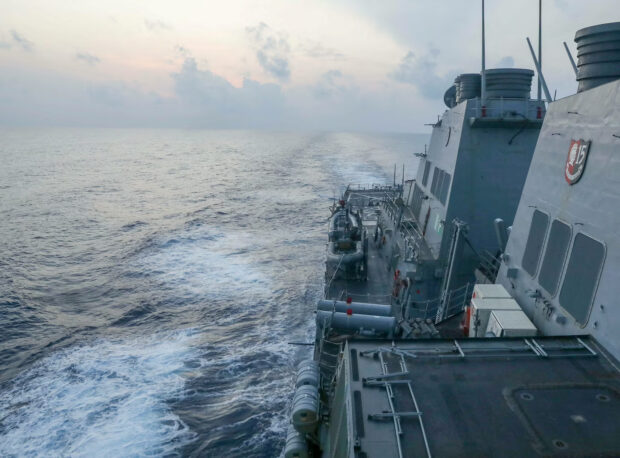
TESTING FREEDOM OF NAVIGATION | The Arleigh Burke-class guided-missile destroyer USS Milius (DDG-69), deployed to the US 7th Fleet area of operations, conducts underway operations at an undisclosed location in the South China Sea in this handout picture released on April 10. (Photo from the US Navy)
MANILA, Philippines — A United States Navy guided-missile destroyer cruised near a Chinese man-made military outpost in the West Philippine Sea on Monday, drawing condemnation from China, which described the warship’s entry into the waters as an “illegal” intrusion.
The USS Milius conducted a freedom of navigation operation within 12 nautical miles or 22 kilometers of Panganiban (Mischief) Reef, a Chinese military base located within the Philippines’ exclusive economic zone (EEZ), and “upheld the rights, freedoms and lawful uses of the sea,” according to the US Navy’s 7th Fleet.
China on Monday assailed the entry of the US warship into waters it claims in the South China Sea.
“Missile destroyer USS Milius illegally intruded into the waters adjacent to the Meiji Reef in China’s Nansha Islands without the approval of the Chinese government,” Tian Junli, spokesperson for the Chinese military’s Southern Theater Command, said in a statement.
The Chinese official added that Beijing’s air force “followed and carried out surveillance of the vessel.”
The US Navy mission took place as China was expected to conclude the third day of its military exercises around Taiwan and as the Philippines and the United States were set to begin their largest ever military exercises on Tuesday.
High-seas freedoms
“USS Milius demonstrated that Mischief Reef, a low-tide elevation in its natural state, is not entitled to a territorial sea under international law,” the 7th Fleet said.
“By engaging in normal operations within 12 nautical miles of Mischief Reef, the United States demonstrated that vessels can lawfully exercise high-seas freedoms in those areas,” it said.
Panganiban Reef, located about 130 nautical miles (240 km) from mainland Palawan, was seized by China from the Philippines in 1995.
Beijing has since transformed the underwater feature into one of its biggest artificially built islands in the Spratly chain, also known in the Philippines as the Kalayaan island group. The island base has a 3-km airstrip, missile shelters, hangars and radars.
The Philippines has nine small military detachments in these waters, which it calls the West Philippine Sea, while other claimants aside from China are maintaining their own outposts.
Some features occupied by the Philippines like Ayungin (Second Thomas) and Pag-asa (Thitu), are located a few nautical miles away from Chinese outposts.
“The land reclamation efforts, installations and structures built on Mischief Reef do not change this characterization under international law,” the 7th Fleet said.
China claims the entire South China Sea, including the West Philippine Sea, waters within the country’s EEZ, while the Philippines, China, Brunei, Vietnam, Taiwan and Malaysia have overlapping claims in the area.
In a landmark 2016 ruling, the Permanent Court of Arbitration in The Hague, Netherlands, rejected China’s massive “nine-dash-line” claims in the sea.
The international tribunal also ruled that Panganiban Reef is a low-tide feature that constitutes part of the EEZ and continental shelf of the Philippines, over which it exercises sovereign rights.
China does not recognize the arbitral ruling.
Sweeping claims
“Unlawful and sweeping maritime claims in the South China Sea pose a serious threat to the freedom of the seas, including the freedoms of navigation and overflight, free trade and unimpeded commerce, and freedom of economic opportunity for South China Sea littoral nations,” the 7th Fleet said.
The destroyer had “asserted navigational rights and freedoms in the South China Sea near the Spratly Islands, consistent with international law,” it added.
After the operation, the Milius “exited the excessive claim area and continued operations in the South China Sea,” it said.
Beginning Tuesday, the United States and the Philippines will stage the 18-day Balikatan military exercises, involving more than 17,000 troops.
Meanwhile, Chinese fighter jets and warships are carrying out three days of military drills around Taiwan, including simulated strikes on the island.
The war games follow a meeting last week between Taiwanese President Tsai Ing-wen and US House Speaker Kevin McCarthy outside Los Angeles.
China’s exercises sparked condemnation from Taipei and a call for restraint from Washington, which said it was “monitoring Beijing’s actions closely.”
On Monday, Beijing said fighter jets carrying “live ammunition” had conducted “simulated strikes” near Taiwan and that its Shandong aircraft carrier was involved in the ongoing exercises.